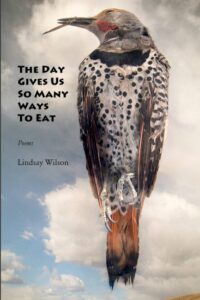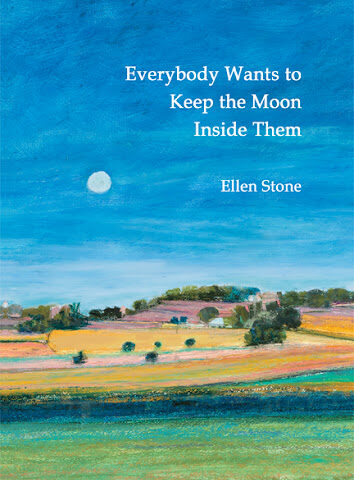
Lindsay Wilson
WordTech Editions, 2022
$18, 94 pages, paper
(sponsored link)
Reviewed by Kathy Nelson
“Dusk is a mouthful of loose teeth, the sky / darkening toward a black eye” writes Lindsay Wilson, signaling with rich imagery the ominous nature of many of these haunting poems. This collection resides at the intersection between the poetry of place and the poetry of personal trauma. It describes a wounding relationship between a boy and his stepfather, the specter of childhood sexual assault, a mother suffering from depression and addiction, the threat of suicide. But these stunning poems also claim a life within the natural world of the high desert of Nevada and affirm a committed, present-day relationship with a beloved wife.
The Day Gives Us So Many Ways to Eat is anchored in literary tradition. One of its most striking poems is “Listen,” with an epigraph from Brigit Pegeen Kelly’s devasting poem “Song.” Wilson’s poem echoes some of Kelly’s themes—the incomprehensible killing of animals for sport, the enduring grief that follows. Wilson deftly draws from the well of Kelly’s poem while shaping something entirely new. There are also poems written for or after Philip Levine. In “Preserving,” an homage to a deeply admired poetic ancestor, Wilson, depicting the beginning of spring, uses surprising language and evocative images worthy of Levine:
All along my evening walk to the bar
the bulbs of March push their hard,
green blades through the soil. At their roots
they sharpen their bright trumpets.
The cherry trees along the striding avenues
have been swindled into this early budding.
Compelling language is at the heart of Wilson’s gift as a poet. Indeed, Wilson finds ways to free language to possibilities that would close if more words or less skillfully chosen words were used: “Your tongue on the tight-rope / of dusk” (from “The Desert’s Retrieval”) and “a woman who followed / you to this desert before wandering off / into the night’s dark throat” (from “Poem Written in an Old Halfway House Remodeled into an Artisanal Coffee Shop”). Such metaphorical language creates strong visual images: “the sun pulled its guitar-string light / through the fence posts across the garden beds / like a blues song shimmering with heat” (from “Watering Can”).
Throughout the collection, place is vividly evoked, as in “Sink.”
And then Nevada
began to teach you its slow contraction, how the land and wind
take their drinks each night until the snow-melt sinks
into the hard-salted earth
It is often a brutal environment, physically and socially, as in “Summer Solstice with Christmas Tree & Wild Horses.”
in that small hot box apartment on the edge of Reno
where the addicts had taken a break
from dismantling the abandoned El Camino
in the open field of desert sweeping out
from below your balcony.
Even so, this is “a world where a garden can grow and its bounty be preserved” (“Preserving”).
This is a powerful collection of poems that weave personal tragedy into an unforgiving landscape and, at the same time, claim a life in the high desert with a loving partner. Astonishing language and images draw the reader forward from one poem to the next. These are poems of resilience. The reader who enters these poems is richly rewarded.
Published in Cider Press Review, Volume 25, Issue 4.
See all items about Kathy Nelson
Visit Kathy Nelson’s contributors page.
See all items about Lindsay Wilson
Visit Lindsay Wilson’s contributors page.


 Kathy Nelson is the 2019 recipient of the James Dickey Prize (Five Points, a Journal of Literature & Art). She holds an MFA in poetry from the Warren Wilson Program for Writers. Along with her two chapbooks, Cattails and Whose Names Have Slipped Away, her work has appeared in numerous journals, including LEON Literary Journal, New Ohio Review, Southern Poetry Review, Tar River Poetry, and Valparaiso Poetry Review. She lives in Nevada.
Kathy Nelson is the 2019 recipient of the James Dickey Prize (Five Points, a Journal of Literature & Art). She holds an MFA in poetry from the Warren Wilson Program for Writers. Along with her two chapbooks, Cattails and Whose Names Have Slipped Away, her work has appeared in numerous journals, including LEON Literary Journal, New Ohio Review, Southern Poetry Review, Tar River Poetry, and Valparaiso Poetry Review. She lives in Nevada. Lindsay Wilson is an English professor at Truckee Meadows Community College where he edits The Meadow. He received a Silver Pen from the Nevada Writers’ Hall of Fame, and his writing has appeared in The Colorado Review, Fourth Genre, Verse Daily, The Missouri Review Poem of the Week, and The Carolina Quarterly. His most recent chapbook, Because the Dirt Here is Poor, is available from Main Street Rag. His first full length, No Elegies, won the Quercus Review Press Book Award in 2014. His latest full length is The Day Gives Us so Many Ways to Eat.
Lindsay Wilson is an English professor at Truckee Meadows Community College where he edits The Meadow. He received a Silver Pen from the Nevada Writers’ Hall of Fame, and his writing has appeared in The Colorado Review, Fourth Genre, Verse Daily, The Missouri Review Poem of the Week, and The Carolina Quarterly. His most recent chapbook, Because the Dirt Here is Poor, is available from Main Street Rag. His first full length, No Elegies, won the Quercus Review Press Book Award in 2014. His latest full length is The Day Gives Us so Many Ways to Eat.


